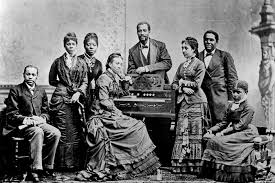


Negro Spirituals were created by Enslaved Africans during the 18th century. In Africa, music was a central part of life; music permeated lives, important events, and daily activities. When they were forced into enslavement and shipped across the world, they weren’t allowed to fellowship music as they used to. Many white colonists disapproved of the Africans’ way of worship style; they felt as though it was idolatrous and wild. Therefore, they banned Enslaved Africans from singing and dancing on the plantation. Music was an essential part of many Enslaved Africans’ lives, so in order to fellowship with each other, they often had secret meetings after worship services. Hundreds of slaves would attend these meetings and dance and fellowship with each other. During these meetings, Enslaved Africans would sing negro spirituals, which they called “corn ditties.” Negro Spirituals were highly linked to their authors’ lives; Enslaved Africans used negro spirituals to express their struggles, pains, hopes, and joys. Negro spirituals were different from hymns and psalms as they shared the challenging conditions of what it is like to be a slave. Negro spirituals were sometimes used as work songs; the enslaved people would sing these songs as they worked. Many Negro Spirituals were sung in call and response style. A leader would improvise a line of text, and a chorus would follow with a solid refrain.
These spirituals were initially passed down from word of mouth until the 1860s. After the civil war, people started to take an interest in the spirituals. This interest led to the first publication of Negro Spirituals in 1867, Slave songs of the United States. This book contained a collection of negro spirituals collected by abolitionists William Frances Allen, Luck Mckim Garrison, and Charles Pickard Ware. The creation led to the formation of the Jubilee Singers; a chorus made up of former slaves from Fisk University. This group performed Negro Spirituals throughout the United States and Europe. The success of this group sparked the creation of many African American choir groups across the country. Many of these groups still exist today. They perform Negro Spirituals and other types of music throughout the country. This has allowed Negro Spirituals to be kept alive today. Also, many of these spirituals have been recorded by various artists on many streaming platforms.
Today, many Historically Black Colleges and Universities have choirs that perform Negro Spirituals across the country. Some examples include, The Jubilee Singers at Fisk University, The Spelman College Glee Club and The Hampton University Concert Choir .

